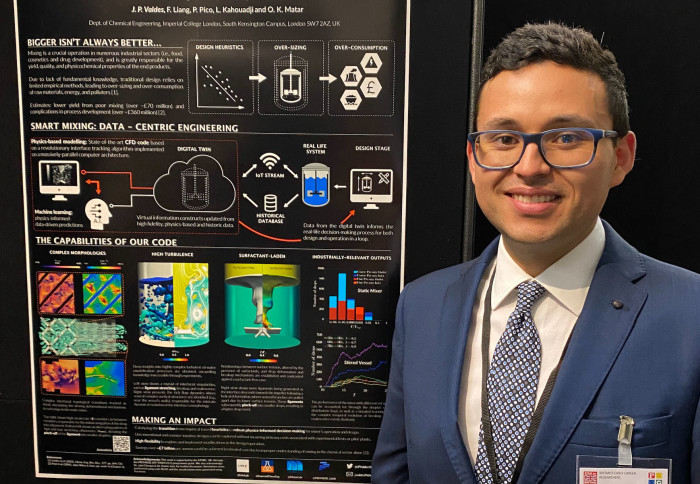Chemical engineering PhD student presents research to Parliament
by Sara West

Juan Pablo Valdes was shortlisted from hundreds of applicants as part of the STEM for BRITAIN competition.
"I feel honoured to have been selected as a finalist for this prestigious event. I am really excited to share our research at Matar Fluids Group with the scientific community in the UK". Juan Pablo Valdes Department of Chemical Engineering
STEM for BRITAIN is a poster competition in the House of Commons involving approximately 120 early stage or early career researchers and judged by professional and academic experts. Juan Pablo Valdes, a PhD student in the Matar Fluids Group, was selected to present a poster on his research into physics-informed computational modelling of complex mixing systems.
On presenting his research in Parliament, he said: “I feel honoured to have been selected as a finalist for this prestigious event. I am really excited to share our research at Matar Fluids Group with the scientific community in the UK, but I am particularly thrilled to extend our work beyond the academic world, where it can make a real and positive impact on the sustainable development of our society.”
The Parliamentary and Scientific Committee runs the event in collaboration with partners including the Royal Academy of Engineering, the Royal Society of Chemistry and the Institute of Physics.
Stephen Metcalfe MP, Chairman of the Parliamentary and Scientific Committee, said:
“This annual competition is an important date in the parliamentary calendar because it gives MPs an opportunity to speak to a wide range of the country’s best young researchers.
“These early career engineers, mathematicians and scientists are the architects of our future and STEM for BRITAIN is politicians’ best opportunity to meet them and understand their work.”
Juan studied chemical engineering at the Universidad de los Andes in Colombia, graduating in 2018 with a Bachelor of Engineering, followed by a Master of Science in 2020. He joined Imperial as a PhD student in 2020 where his research focuses on numerical simulations of complex mixing systems, specifically those which are used by industry. The results of his work can be used in optimisation algorithms and AI models when designing mixing systems.
Professor Omar Matar, Juan’s supervisor, commented: “I am very pleased to see Juan’s work being recognised by being selected as a finalist for STEM for Britain. It’s exactly the kind of encouragement a researcher needs at the start of a very promising career.”
Article text (excluding photos or graphics) © Imperial College London.
Photos and graphics subject to third party copyright used with permission or © Imperial College London.
Reporter
Sara West
Communications Division